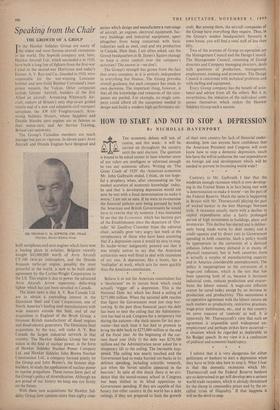HOW TO START AND NOT TO STOP A DEPRESSION
By NICHOLAS DAVENPORT
THE economic debate will not, of course, end this week : it will be carried on throughout the country until the next election. The question is bound to be asked sooner or later whether some of our rulers are intelligent or informed enough to run our economic affairs. Writing on 'The Great Crash of 1929' the American economist Mr. John Galbraith ended, I think, on too hope- ful a prophecy when, after commenting on 'the modest accretion of economic knowledge' today, he said that 'a developing depression would not now be met with a fixed determination to make it worse.' I am not so sure. If he were to re-examine the financial policies now being pursued by both the American and British Governments he would have to rewrite that sly sentence. I was interested id see that the Economist, which has become part of the Establishment since the departure of 'Out- sider' Sir Geoffrey Crowther from the editorial chair, actually grew very angry last week at the complacency of those who have been assuming that if a depression came it would be easy to stop. Its leader-writer indignantly pointed out that it was simply untrue to say that the American authorities were well fitted to deal with recessions of any size. A depression, like a boom, has a `multiplier' at work, which acts far more quickly than the American constitution.
* * * Believe it or not the American constitution has a 'decelerator' on its statute book which could actually 'trigger off' a depression. This is the National Debt Act which has fixed a ceiling of $275,000 million. When the national debt reaches that figure the Government must just stop bor- rowing. In the past three financial years the debt has been so near the ceiling that the Administra- tion has had to ask Congress for a temporary rise during the autumn—the slack season for tax pay- ments—but each time it has had to promise to bring the debt back to $275,000 million at the end of the fiscal year. At the beginning of the cur- rent fiscal year (July 1) the debt was $270,500 million and the Administration never asked for a temporary lift to the ceiling. The inevitable hap- pened. The ceiling was nearly touched and the Government had to make hurried cut-backs in its defence spending, including scientific research, just when the Soviet satellite appeared in the heavens! In spite of this shock there is no evi- dence that the sound-money school in Congress has been shifted in its blind opposition to Government spending. If they are capable of this lunacy (no other country in the world has a debt ceiling), if they are prepared to limit the growth of their own country for lack of financial under- standing, how can anyone have confidence that the American President and Congress will even know how to stop a domestic depression, much less have the will to authorise the vast expenditures on foreign aid and development which will be needed to prevent its becoming world wide?
Contrary to Mr. Galbraith I fear that the moderate enough recession which is now develop- ing in the United States is in fact being met with `a determination to make it worse'—on the part of the Federal Reserve. Much the same is happening in Britain with Mr. Thorneycroft playing the part of wicked banker in the best Montagu Norman style. A recession usually starts with a decline in capital expenditures after a fairly prolonged period of high investment in buildings, plant and inventories. This decline has started and is deliber- ately being made worse by dear money and a credit squeeze and by direct cuts in Government spending in both countries. Such a policy would be appropriate to the correction of a demand inflation (where money demand is in excess of physical resources), but in both countries there is actually a surplus of manufacturing capacity and in America considerable unemployment. The policy is inappropriate to the correction of a wage-cost inflation, which is the sort that has been upsetting both of us, because it increases industrial costs, reduces production and exacer- bates the labour unions. A wage-cost inflation cannot be cured today except by an increase in production and productivity. This necessitates a co-operative agreement with the labour unions on such matters as productivity, restrictive practices, wage-price stabilisation, etc., and in this country on some measure of 'controls' as well. It is apparently Mr. Thorneycroft's view that such an agreement is impossible until widespread un- employment and perhaps strikes have occurred— a situation which he regarded as deplorable in his Budget speech. In my view it is a confession of political and economic bankruptcy.
* * * I submit that it is very dangerous for either politicians or bankers to start a depression when they have so little idea how to stop it. What I fear is that the domestic recessions which Mr. Thorneycroft and the Federal Reserve bankers are so determined to get will develop into a serious world trade recession, which is already threatened by the slump in commodity prices and by the so- called 'crisis of illiquidity.' If that happens it will be the devil to stop.
































 Previous page
Previous page